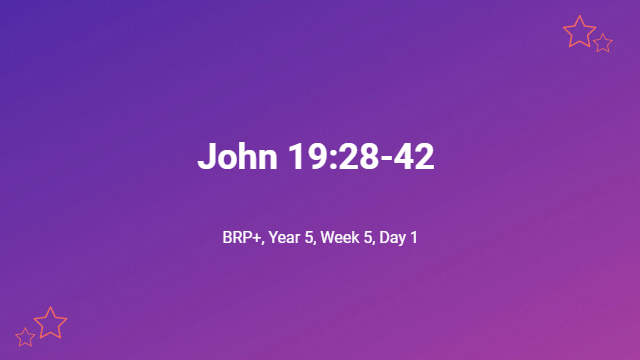John 19:28-42
Q.1. Why was Jesus given sour wine to drink? How did John explain the final words of Jesus? Was His cry a cry of despair? – (Jn.19:28-30 c.f. Lk.23:46)
The other Gospel writers told us that Jesus was given sour wine to drink (Mt.28:48). John told us that this happened because Jesus knew that all things had already been accomplished to fulfill the Scriptures, so Jesus said – “I am thirsty” (Jn.19:28). Jesus would make only two more utterances – It is finished! And He bowed His head and gave up His spirit (Jn.19:30) and – Jesus, crying in a loud voice said – Father, into Your hands I commit My spirit (Lk.23:46). He then breathed His last. It seems that Jesus wanted to muster up His strength for these final triumphant declarations. In other words, Jesus was in total control, because there was no more to be done when He yielded up His life (Jn.10:18). This accords with his earlier point – Jesus, knowing that the Father had given all things into His hands, and that He had come forth from God and was going back to God (Jn.13:3). John was at pains to convey that the death of Christ was no accident. Rather, all happened by God’s design, even as foretold in the Scriptures.
Q.2. Why did the Jews want the legs of the crucified men broken? What treatment was given to the body of Jesus? Why was this remarkable? What point did John want to make? – (Jn.19:31-36)
The Jews were meticulous in keeping the letter of the law, which said – 22 “If a man has committed a sin worthy of death and he is put to death, and you hang him on a tree, 23 his corpse shall not hang all night on the tree, but you shall surely bury him on the same day (for he who is hanged is cursed of God), so that you do not defile your land which the Lord your God gives you as an inheritance (Dt.21:22-23). Though they had unjustly had an innocent Man crucified, they were still seemingly doing right according to the Jewish laws. The Sabbath was normally the seventh day. However, the day when Jesus died as the sacrificial Lamb of God, to do away with the need of further sacrifices, was the Passover – … for that Sabbath was a high day … (see Jn.19:31). Therefore, in compliance with their laws, they asked permission from Pilate to make sure that the men were dead, so that their bodies might be taken away. John recorded two amazing fulfilments of the Prophetic Scripture. Believing that Jesus was already dead, they thrust a spear into His side – and immediately blood and water (serum) came out – signifying that He was dead (Jn.19:34). John also understood that – … another Scripture says, “They shall look on Him whom they pierced” (Jn.19:37). Consequently – these things came to pass to fulfill the Scripture, “Not a bone of Him shall be broken” (Jn.19:36 c.f. Ps.34:20). The dead Saviour had no control over any of these events. However, God, the Father did … and He had revealed it in the prophetic Scriptures repeatedly years earlier.
Q.3. How speedily was the body of Jesus placed in the garden tomb? Who were the men who embalmed and buried the body of Jesus? In what way did the embalming of Jesus support the fact that Jesus was dead? (Jn.19:38-42 c.f. Jn.19:31; Is.53:9)
All kinds of things could have happened under cover of darkness. However, the body of Jesus was already embalmed and entombed by nightfall (see Jn.19:31, 38). The Jews went to extreme lengths to ensure that there was no activity that would support the claims of Jesus that – after three days I am to rise again (Mt.27:63). They petitioned Pilate – Therefore, give orders for the grave to be made secure until the third day, otherwise His disciples may come and steal Him away and say to the people, `He has risen from the dead,’ and the last deception will be worse than the first” (Mt.27:64). The testimony of John when reporting the actions of Joseph of Arimathea and Nicodemus, when taking the body of Jesus and placing Him in a tomb on the Passover Day, was crucial. The body of Jesus was bound in linen wrappings which were soaked in a hundred pounds of sticky mixture of myrrh and aloes. This would have set hard after a day. No man could have breathed in such a capsule. Joseph and Nicodemus were men of repute and both part of the Sanhedrin, the Jewish ruling council. They had become believers who followed Jesus (see Jn.3:1; 7:50-51; Lk.23:51). Joseph awaited the Kingdom of God (see Lk.27:52. Nicodemus was a righteous leading teacher in Israel (see MK.15:51; Jn.3:10).

